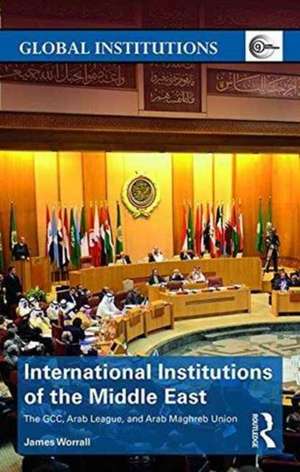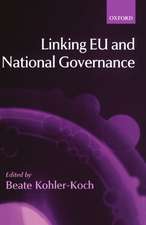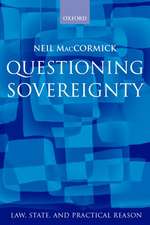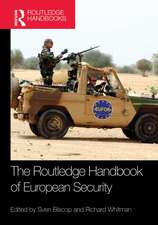International Institutions of the Middle East: The GCC, Arab League, and Arab Maghreb Union: Global Institutions
Autor James Worrallen Limba Engleză Paperback – 16 mar 2017
The book:
- assesses the reasons why IOs in the Middle East are under-developed relative to neighbouring regional organizations;
- explores their history, evolution, and structure, while considering the successes and failures of each IO;
- analyses the reasons for the specific difficulties faced by each organization through the context of intra-regional relations;
- develops a new framework for analysing the forces that have shaped these bodies and challenges the existing narrative that largely ignores the achievements and prospects of the organizations;
- considers the likely impact of the Arab Spring upon the future development of these frequently overlooked regional international organizations.
This book will be of great interest to students and scholars of Middle East studies, international organizations, and global governance, as well as diplomats and policymakers
| Toate formatele și edițiile | Preț | Express |
|---|---|---|
| Paperback (1) | 381.00 lei 6-8 săpt. | |
| Taylor & Francis – 16 mar 2017 | 381.00 lei 6-8 săpt. | |
| Hardback (1) | 1054.71 lei 6-8 săpt. | |
| Taylor & Francis – 27 mar 2017 | 1054.71 lei 6-8 săpt. |
Din seria Global Institutions
-
 Preț: 306.81 lei
Preț: 306.81 lei -
 Preț: 294.01 lei
Preț: 294.01 lei -
 Preț: 326.01 lei
Preț: 326.01 lei -
 Preț: 346.55 lei
Preț: 346.55 lei -
 Preț: 286.43 lei
Preț: 286.43 lei -
 Preț: 303.17 lei
Preț: 303.17 lei -
 Preț: 326.36 lei
Preț: 326.36 lei -
 Preț: 301.40 lei
Preț: 301.40 lei -
 Preț: 316.56 lei
Preț: 316.56 lei -
 Preț: 310.65 lei
Preț: 310.65 lei -
 Preț: 279.80 lei
Preț: 279.80 lei -
 Preț: 271.41 lei
Preț: 271.41 lei -
 Preț: 279.88 lei
Preț: 279.88 lei -
 Preț: 356.46 lei
Preț: 356.46 lei -
 Preț: 188.80 lei
Preț: 188.80 lei -
 Preț: 345.89 lei
Preț: 345.89 lei -
 Preț: 363.25 lei
Preț: 363.25 lei -
 Preț: 363.20 lei
Preț: 363.20 lei - 18%
 Preț: 1001.55 lei
Preț: 1001.55 lei - 31%
 Preț: 761.76 lei
Preț: 761.76 lei - 18%
 Preț: 999.82 lei
Preț: 999.82 lei -
 Preț: 447.90 lei
Preț: 447.90 lei -
 Preț: 386.70 lei
Preț: 386.70 lei -
 Preț: 440.69 lei
Preț: 440.69 lei -
 Preț: 369.18 lei
Preț: 369.18 lei -
 Preț: 368.90 lei
Preț: 368.90 lei -
 Preț: 345.89 lei
Preț: 345.89 lei -
 Preț: 360.10 lei
Preț: 360.10 lei - 18%
 Preț: 998.71 lei
Preț: 998.71 lei - 18%
 Preț: 1113.25 lei
Preț: 1113.25 lei -
 Preț: 358.84 lei
Preț: 358.84 lei - 17%
 Preț: 246.93 lei
Preț: 246.93 lei - 18%
 Preț: 1160.47 lei
Preț: 1160.47 lei - 18%
 Preț: 1052.38 lei
Preț: 1052.38 lei -
 Preț: 381.03 lei
Preț: 381.03 lei -
 Preț: 364.51 lei
Preț: 364.51 lei - 28%
 Preț: 819.48 lei
Preț: 819.48 lei - 18%
 Preț: 1106.36 lei
Preț: 1106.36 lei - 18%
 Preț: 999.46 lei
Preț: 999.46 lei - 31%
 Preț: 764.87 lei
Preț: 764.87 lei
Preț: 381.00 lei
Nou
Puncte Express: 572
Preț estimativ în valută:
72.91€ • 79.17$ • 61.25£
72.91€ • 79.17$ • 61.25£
Carte tipărită la comandă
Livrare economică 23 aprilie-07 mai
Preluare comenzi: 021 569.72.76
Specificații
ISBN-13: 9780415814270
ISBN-10: 0415814278
Pagini: 210
Ilustrații: 4
Dimensiuni: 138 x 216 x 16 mm
Greutate: 0.25 kg
Ediția:New.
Editura: Taylor & Francis
Colecția Routledge
Seria Global Institutions
Locul publicării:Oxford, United Kingdom
ISBN-10: 0415814278
Pagini: 210
Ilustrații: 4
Dimensiuni: 138 x 216 x 16 mm
Greutate: 0.25 kg
Ediția:New.
Editura: Taylor & Francis
Colecția Routledge
Seria Global Institutions
Locul publicării:Oxford, United Kingdom
Public țintă
Postgraduate and UndergraduateCuprins
Prologue
Introduction
1. Context and Framework
2. The Arab League, Structures and Evolution
3. The Arab League, Peace and Security
4. The Arab League, Economic, Social, and Cultural Co-operation
5. The Arab League, Problems and Prospects
6. The GCC, Structures and Evolution
7. The GCC, Security, Peace, and Defense
8. The GCC, Economic, Social, and Cultural Co-operation
9. The GCC, Problems and Prospects
10. The Arab-Maghreb Union
11. The Arab League and GCC in the Arab Spring
Conclusion
Select Bibliography
Introduction
1. Context and Framework
2. The Arab League, Structures and Evolution
3. The Arab League, Peace and Security
4. The Arab League, Economic, Social, and Cultural Co-operation
5. The Arab League, Problems and Prospects
6. The GCC, Structures and Evolution
7. The GCC, Security, Peace, and Defense
8. The GCC, Economic, Social, and Cultural Co-operation
9. The GCC, Problems and Prospects
10. The Arab-Maghreb Union
11. The Arab League and GCC in the Arab Spring
Conclusion
Select Bibliography
Notă biografică
James Worrall is Associate Professor in International Relations and Middle East Studies, in the School of Politics and International Studies (POLIS) at the University of Leeds, UK. His research interests lie in the broad fields of Security Studies and International Relations with a primary geographical focus on both the Gulf and the Levant. The thematic focus of his work explores Western relations with the Arab World, Gulf Politics and Security, Regional International Organizations, Counterinsurgency, Civil Wars, Post Conflict Reconstruction (especially Security Sector Reform), and Regime Stability and Legitimacy in non-democratic states. He has published widely on these themes in journals such as Third World Quarterly, Middle Eastern Studies, and Studies in Conflict & Terrorism. His previous volumes include: Statebuilding and Counterinsurgency in Oman: Political, Military and Diplomatic Relations at the End of Empire and (with Simon Mabon and Gordon Clubb) Hezbollah: From Islamic Resistance to Government.
Recenzii
'James Worrall has produced a classic here! With so much international attention on the MENA region and the crisis of state and society at its Arab core, it is surprising that no substantial and systematic analysis of the main structures of the regional system – its key institutions – has been available in one volume. This substantial study addresses that shortcoming, I believe, bringing together the conceptual tools for deciphering MENA regionalization as well as the rich empirical data for understanding it. Dr Worrall shows that these institutions matter and do have a role to play in shaping the region’s fortunes. I will certainly want a copy of this book by my side. '- Anoush Ehteshami, Durham University, UK
'In this clear, accessible and yet exhaustive volume the author does an excellent job of highlighting the genesis, evolution and principal features of the major international organizations in the Arab speaking world. He does so in a sympathetic and yet probing manner advancing the literature on regionalism and regionalization. This book is a must read for all students of international relations of the Middle East and will prove very useful for everyone interested in international relations more widely" Matteo Legrenzi, Associate Professor, Ca’ Foscari University of Venice, President of the Italian Association for Middle Eastern Studies (SeSaMO) 2013-2016.' - Matteo Legrenzi, Ca' Foscari University of Venice, Italy
'Worrall has produced a rigorous and scholarly work that adds to our knowledge and understanding of the three institutions in focus - the Gulf Cooperation Council, the Arab League and the Arab Maghreb Union. More than that, he offers a valuable comparative examination of some of the major institutions at the heart of the contemporary Arab world. A timely and welcome study.' - Rory Miller, Professor of Government, Georgetown University, Qatar
'This important and timely volume will provide immense practical value to scholars and policymakers as a tool to contextualize and analyze rapidly-changing regional developments across the Middle East and North Africa in the aftermath of the Arab Spring.' - Kristian Coates Ulrichsen, Fellow for the Middle East, Rice University's Baker Institute, USA
'In this clear, accessible and yet exhaustive volume the author does an excellent job of highlighting the genesis, evolution and principal features of the major international organizations in the Arab speaking world. He does so in a sympathetic and yet probing manner advancing the literature on regionalism and regionalization. This book is a must read for all students of international relations of the Middle East and will prove very useful for everyone interested in international relations more widely" Matteo Legrenzi, Associate Professor, Ca’ Foscari University of Venice, President of the Italian Association for Middle Eastern Studies (SeSaMO) 2013-2016.' - Matteo Legrenzi, Ca' Foscari University of Venice, Italy
'Worrall has produced a rigorous and scholarly work that adds to our knowledge and understanding of the three institutions in focus - the Gulf Cooperation Council, the Arab League and the Arab Maghreb Union. More than that, he offers a valuable comparative examination of some of the major institutions at the heart of the contemporary Arab world. A timely and welcome study.' - Rory Miller, Professor of Government, Georgetown University, Qatar
'This important and timely volume will provide immense practical value to scholars and policymakers as a tool to contextualize and analyze rapidly-changing regional developments across the Middle East and North Africa in the aftermath of the Arab Spring.' - Kristian Coates Ulrichsen, Fellow for the Middle East, Rice University's Baker Institute, USA
Descriere
This book aims to be the key introductory volume for understanding the regional IOs of the Middle East. It assesses the reasons why IOs in the Middle East are so ill developed, explores their history, evolution and the successes and failures of each IO. It also analyses the reasons for the specific difficulties faced by each organisation through the context of intra-regional relations, before examining the impact of external factors such as: globalisation, moves towards global governance which have impacts in the Middle East and external influences from the great powers. Finally, it explores the likely impact of the Arab Spring upon the prospects for the further development of these regional International Organisations


















